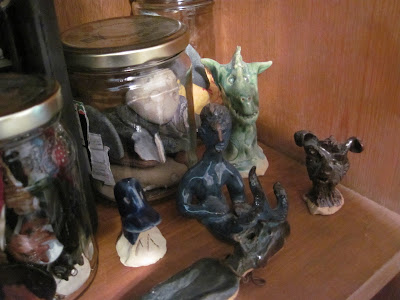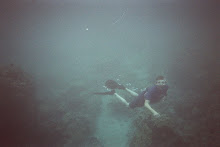
Or, Time-Travel: 1988. Can you call it juvenilia, if you wrote it at age 21 or 22? Here's a poem I rediscovered while rummaging through old boxes in storage; I was supposed to be culling the past, and here I am, not or not yet. Listen: I'm not sure what I was trying to get at then, and there are phrases that make me cringe now, but I like how it all sounds, like the rhythms and the singing (yes, singing) still.
Besides having read my Melville, Stevenson, Coleridge, London, and such, I must have been reading John Gardner's
The King's Indian at the time. (Also, "grim" sure shows up a lot; why? Was that my stab at "serious"?)
A slightly different version was published in Byzantium: Vol. III, by the Associated Students of UC Berkeley back in 1988. I'd written it a bit before that. I'm not claiming any merits beyond modeling exuberance by posting "Sea Doggerel" here.
SEA DOGGEREL
The hard deck heaves; the sea flames white.
The troubled crests shudder against the night
As the sky tumbles into the surge.
Melville stalks tavern planks, turning
A page--as the sea-swells do--and stark Ahab
Turns to in his mind. He drinks the mild Mermaid wine
And sets his words in stalwart verse, carefully
Weighed as an Emperor's gaze, falling far
Fathoms deep. (Through crusted hulls, clear songs breach,
The black and white leviathans of the deep.)
The untiring winds hurl us on. The old ropes snap
And flap and straight-a-way crack. The storm is strong.
"Land ho, ahoy!" a salt-washed sailor cries,
The clerk in tar-cloth, narrowing his eyes
At these winded shores of Withaven Cove.
The ship lists, to port, as his mind does rove
Where he hangs aloft ere Nowhere's icy rim,
Dangling fast from the mind's mainmast limb.
Aye, this shallow ship is shot, it leaks,
The broad beams split, and bald rats starving
Pace the hold, planking painted
With grim phosphorous--that stinking ship glow.
The salted clerk--no whaler, no mariner he--
Fears the great white birds that fail to flee.
Fall waters gnaw the windy shores. Siren
Songs call and the Christian seaman
Moans and rings the old church bell.
Ding-dong, dong-dirge, the cold
Swell's surge and the drowned man's bones
Shake and swell to fill the tones.
Words, grim words, are a seaman's lot,
The rotten grog that the Devil's wrought.
When the storm's aloft, it's grim advice
That whaler's bones be but hump-backed dice.
 GRENDEL'S HEIRS
GRENDEL'S HEIRS 


























